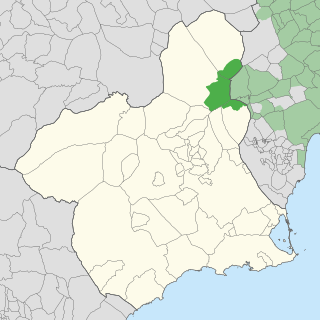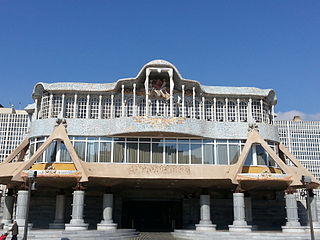
Murcia is a city in south-eastern Spain, the capital and most populous city of the autonomous community of the Region of Murcia, and the seventh largest city in the country. It had a population of 460,349 inhabitants in 2021. The total population of the metropolitan area was 672,773 in 2020, covering an urban area of 1,230.9 km2. It is located on the Segura River, in the southeast of the Iberian Peninsula. It has a climate with hot summers, mild winters, and relatively low precipitation.

Orihuela is a city and municipality located at the foot of the Sierra de Orihuela mountains in the province of Alicante, Valencian Community, Spain. The city is in one of the only Spanish-speaking areas of the Valencian Community.

Murcian is a variant of Peninsular Spanish, spoken mainly in the autonomous community of Murcia and the adjacent comarcas of Vega Baja del Segura and Alto Vinalopó in the province of Alicante (Valencia), the corridor of Almansa in Albacete. In a greater extent, it may also include some areas that were part of the former Kingdom of Murcia, such as southeastern Albacete and parts of Jaén and Almería.

Carche is a mountainous, sparsely populated area in the Region of Murcia, Spain, lying between the municipalities of Jumilla and Yecla. The mountains reach an elevation of 1,371 metres at the Pico de la Madama and part of the region has the status of regional park. Three villages border the park: Raspay, La Alberquilla and Carche, with a total of 182 inhabitants (2005).

Torre-Pacheco is a municipality in the autonomous community of Murcia in southeastern Spain. It covers an area of 189.4 km2 and its population in 2019 was 35,676. The only high ground in the municipality is Cabezo Gordo hill, the location of the protected Sima de las Palomas archeological site. The town has one secondary education institution, the I.E.S. Gerardo Molina.

The Region of Murcia is an autonomous community of Spain located in the southeastern part of the Iberian Peninsula, on the Mediterranean coast. The region is 11,313 km2 (4,368 sq mi) in area and had a population of 1,511,251 as at the start of 2020. About a third of its population lives in the capital, Murcia, and a seventh in the second city, Cartagena. At 2,014 m (6,608 ft), the region's highest point is Los Obispos Peak in the Massif of Revolcadores.
Isaac Jové Rubí is a Spanish retired footballer who played as an attacking midfielder, currently a manager.

After roughly two decades as a protectorate of the Crown of Castile, the territory of the Taifa of Murcia became the Kingdom of Murcia in the wake of its conquest by Aragon and ensuing return to Castile triggered by the 1264–1266 Múdejar revolt. It preserved such status up until Javier de Burgos' provincial division of Spain in 1833. This was a "kingdom" ("reino") in the second sense given by the Diccionario de la lengua española de la Real Academia Española: the Crown of Castile consisted of several such kingdoms. Its extent is detailed in Respuestas Generales del Catastro de Ensenada (1750–54), which was part of the documentation of a census. Falling largely within the present-day Region of Murcia, it also included parts of the province of Albacete, the municipalities of Villena and Sax in the province of Alicante, and some localities in the province of Jaén.

The 2011 Murcian regional election was held on Sunday, 22 May 2011, to elect the 8th Regional Assembly of the autonomous community of the Region of Murcia. All 45 seats in the Regional Assembly were up for election. The election was held simultaneously with regional elections in twelve other autonomous communities and local elections all throughout Spain.

Cartagena is a Spanish city and a major naval station on the Mediterranean coast, south-eastern Iberia. As of January 2018, it has a population of 218,943 inhabitants. This makes Cartagena Murcia's second-largest municipality and Spain's sixth-largest city that is not a provincial-capital. The wider urban or metropolitan area of Cartagena, known as Campo de Cartagena, has a population of 409,586 inhabitants.

Vicente Tomás Medina was a Spanish poet, dramatist and editor, and a symbol of local identity for the Murcia region of southeastern Spain. His best-known work, Aires murcianos, was taken up as a reference point for local cultural and social criticism, and was widely praised by contemporaries. In his time Medina was considered in Spain to be one of the country's most important writers, referred to as "the great contemporary Spanish poet" and "the Spanish poet of poets". His fame has since declined, and he is now little read; but he remains an important figure as the greatest poet to have written in the Murcian dialect.

The 2015 Murcian regional election was held on Sunday, 24 May 2015, to elect the 9th Regional Assembly of the autonomous community of the Region of Murcia. All 45 seats in the Regional Assembly were up for election. The election was held simultaneously with regional elections in twelve other autonomous communities and local elections all throughout Spain.

The 1983 Murcian regional election was held on Sunday, 8 May 1983, to elect the 1st Regional Assembly of the autonomous community of the Region of Murcia. All 43 seats in the Regional Assembly were up for election. The election was held simultaneously with regional elections in twelve other autonomous communities and local elections all throughout Spain.

The 1991 Murcian regional election was held on Sunday, 26 May 1991, to elect the 3rd Regional Assembly of the autonomous community of the Region of Murcia. All 45 seats in the Regional Assembly were up for election. The election was held simultaneously with regional elections in twelve other autonomous communities and local elections all throughout Spain.

The 1995 Murcian regional election was held on Sunday, 28 May 1995, to elect the 4th Regional Assembly of the autonomous community of the Region of Murcia. All 45 seats in the Regional Assembly were up for election. The election was held simultaneously with regional elections in twelve other autonomous communities and local elections all throughout Spain.

The 2007 Murcian regional election was held on Sunday, 27 May 2007, to elect the 7th Regional Assembly of the autonomous community of the Region of Murcia. All 45 seats in the Regional Assembly were up for election. The election was held simultaneously with regional elections in twelve other autonomous communities and local elections all throughout Spain.

The 2019 Murcian regional election was held on Sunday, 26 May 2019, to elect the 10th Regional Assembly of the autonomous community of the Region of Murcia. All 45 seats in the Regional Assembly were up for election. The election was held simultaneously with regional elections in eleven other autonomous communities and local elections all throughout Spain, as well as the 2019 European Parliament election.

The Canton of Cartagena, also known as the Canton of Murcia, was a period of Cartagena, Spain's history when it was governed by a radical cantonalist junta for six months between 1873 and 1874. The city rose up in armed insurrection on July 12, 1873 establishing the Canton's de facto independence from the First Spanish Republic and beginning a wave of cantonal rebellions across southern Spain. Loosely inspired by the more well-known Paris Commune two years earlier, the Canton of Cartagena existed during a turbulent revolutionary period of Spanish history known as the Sexenio Democrático.

Movimiento Ciudadano de Cartagena is a federations of political parties in the region of Murcia, Spain. Its primary strength is located in the city of Cartagena. It advocates for cartagenerism, a social, political and ideological movement in Spain centered in Cartagena, which pursues the right and recognition of an autonomous territory separated from the rest of Murcia that includes this municipality and its region, Campo de Cartagena, which includes the municipalities of La Unión, Los Alcázares, San Javier, San Pedro del Pinatar, Torre Pacheco, Fuente Álamo, some districts in the south of Murcia, such as Lobosillo, as well as Mazarrón ; as well as the defense of the identity of Cartagena and its environment. According to its political program, it also advocates for women's and LGBT rights and environmentalism. The party promotes regional biprovinciality as a way of "not having to identify the entire Region with [the] municipality [of Murcia], enjoy greater autonomy and achieve greater political weight" in the Cortes Generales.

The 10th Assembly of Murcia was the meeting of the Regional Assembly of Murcia, with the membership determined by the results of the 2019 regional election held on 26 May 2019. The parliament met for the first time on 11 June 2019. According to the Statute of Autonomy of Murcia the maximum legislative term of assembly is 4 years from the preceding election.

















